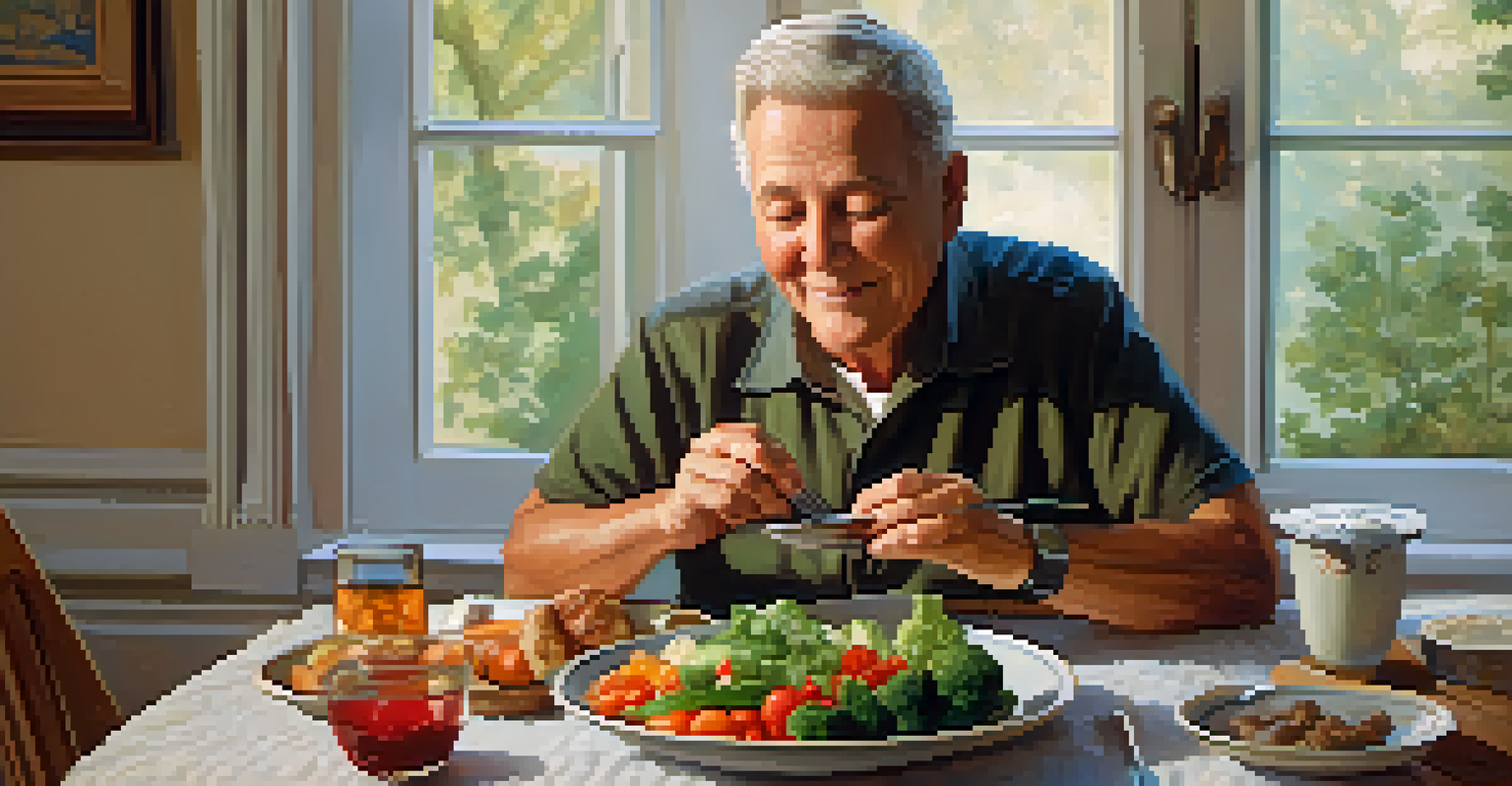Maintaining a Healthy Weight: Nutrition Tips for Older Adults

Understanding the Importance of Healthy Weight for Seniors
Maintaining a healthy weight is crucial for older adults as it directly impacts their overall health and quality of life. Weight management can help reduce the risk of chronic diseases such as diabetes, heart disease, and arthritis. Additionally, a healthy weight can enhance mobility and energy levels, making daily activities more enjoyable.
Eating well is a form of self-respect.
As we age, our metabolism tends to slow down, which can lead to weight gain if not managed properly. This makes it essential for older adults to be mindful of both their caloric intake and physical activity. A balanced approach can prevent unwanted weight gain and promote a healthier lifestyle.
Furthermore, maintaining a healthy weight can contribute to better mental health and well-being. Feeling good about one's body and health can boost self-esteem and encourage social interactions, which are vital for emotional support and happiness.
The Role of Nutrient-Dense Foods in Weight Management
For older adults, focusing on nutrient-dense foods is a powerful way to maintain a healthy weight. Nutrient-dense foods provide essential vitamins and minerals without excessive calories, making them perfect for seniors who need to manage their weight. Foods like fruits, vegetables, whole grains, and lean proteins should be the cornerstone of any diet.

Incorporating a variety of colors on your plate can not only make meals more visually appealing but also ensures a range of nutrients. For example, leafy greens offer calcium and fiber, while berries are packed with antioxidants. This diversity can help prevent deficiencies while keeping calorie counts in check.
Healthy Weight Impacts Seniors' Lives
Maintaining a healthy weight is essential for older adults as it significantly reduces the risk of chronic diseases and enhances overall well-being.
Moreover, nutrient-dense foods can help older adults feel full longer, reducing the temptation to snack on high-calorie, low-nutrient foods. This satisfaction can lead to better portion control and more mindful eating habits, making it easier to maintain a healthy weight.
Portion Control: Key to Balanced Eating Habits
Understanding portion control is vital for older adults trying to maintain a healthy weight. As metabolism slows with age, the body's caloric needs also decrease, making it essential to adjust portion sizes accordingly. Learning to recognize proper serving sizes can help prevent overeating while still enjoying meals.
The greatest wealth is health.
A helpful method for visualizing portion sizes is using everyday objects. For instance, a serving of protein should be about the size of a deck of cards, while a serving of vegetables can be compared to the size of a baseball. This approach can simplify portion control and make it easier to stick to healthier eating habits.
Additionally, using smaller plates and bowls can create the illusion of larger portions, leading to greater satisfaction with fewer calories. By being mindful of portion sizes, older adults can enjoy their favorite foods while still working towards a healthy weight.
Hydration: A Critical Component of Health and Weight
Staying hydrated is often overlooked, but it's a critical component of maintaining a healthy weight, especially for older adults. Proper hydration supports digestion, nutrient absorption, and even metabolism. Drinking enough water can also help manage hunger cues, as sometimes our bodies confuse thirst with hunger.
Older adults should aim for at least 8 cups of fluids a day, adjusting for factors like activity level and climate. Keep in mind that hydration can come from various sources, including water, herbal teas, and even water-rich foods like fruits and vegetables. This variety can make it easier to meet hydration needs.
Nutrient-Dense Foods Are Essential
Focusing on nutrient-dense foods helps seniors manage their weight effectively while ensuring they receive essential vitamins and minerals.
It's also essential for seniors to be aware of their hydration needs, as the sensation of thirst may diminish with age. Keeping a water bottle handy or setting reminders can encourage regular fluid intake, ultimately supporting weight management and overall health.
The Benefits of Regular Physical Activity for Weight Control
Engaging in regular physical activity is a cornerstone of maintaining a healthy weight for older adults. Exercise not only helps burn calories but also builds muscle mass, which can boost metabolism. Even simple activities like walking, gardening, or dancing can contribute to a more active lifestyle.
It's important for seniors to choose activities they enjoy, as this makes it easier to stick with a routine. Group classes or community activities can also provide social interaction, making exercise more enjoyable. Finding a workout buddy can add an element of accountability and fun.
Incorporating strength training into the routine is especially beneficial, as it helps counteract the natural loss of muscle mass that occurs with aging. Aim for at least two days of strength training per week, focusing on major muscle groups. Together with aerobic exercises, this balanced approach can significantly aid in maintaining a healthy weight.
Mindful Eating: Listening to Your Body's Signals
Mindful eating is an effective strategy for older adults looking to maintain a healthy weight. It involves paying attention to hunger and fullness cues, as well as savoring each bite. This practice can help prevent overeating by encouraging a deeper connection with the food being consumed.
To enhance mindful eating, try eliminating distractions during meals, such as television or smartphones. Instead, focus on the flavors, textures, and aromas of the food. This heightened awareness can lead to a more satisfying eating experience and help you recognize when you're truly full.
Hydration and Activity Matter
Staying hydrated and engaging in regular physical activity are crucial components for older adults to maintain a healthy weight and improve quality of life.
Additionally, taking time to chew food thoroughly and enjoy the meal can slow down eating, allowing the body to register fullness more effectively. By practicing mindful eating, older adults can create healthier relationships with food, ultimately supporting their weight management goals.
Seeking Professional Guidance for Personalized Nutrition
For older adults, seeking professional guidance can be an invaluable step in maintaining a healthy weight. A registered dietitian or nutritionist can provide tailored advice, taking into account individual health conditions, dietary preferences, and lifestyle. This personalized approach can lead to more effective and sustainable weight management.
Moreover, professionals can help identify potential nutritional deficiencies and suggest strategies to address them. For instance, if an older adult is lacking in vitamin D, a dietitian might recommend specific food sources or supplements. This targeted support can lead to improved health and well-being.

Don't hesitate to reach out for help; many community programs offer free or low-cost nutrition counseling for seniors. With the right guidance, older adults can make informed choices that support their weight management efforts and overall health.